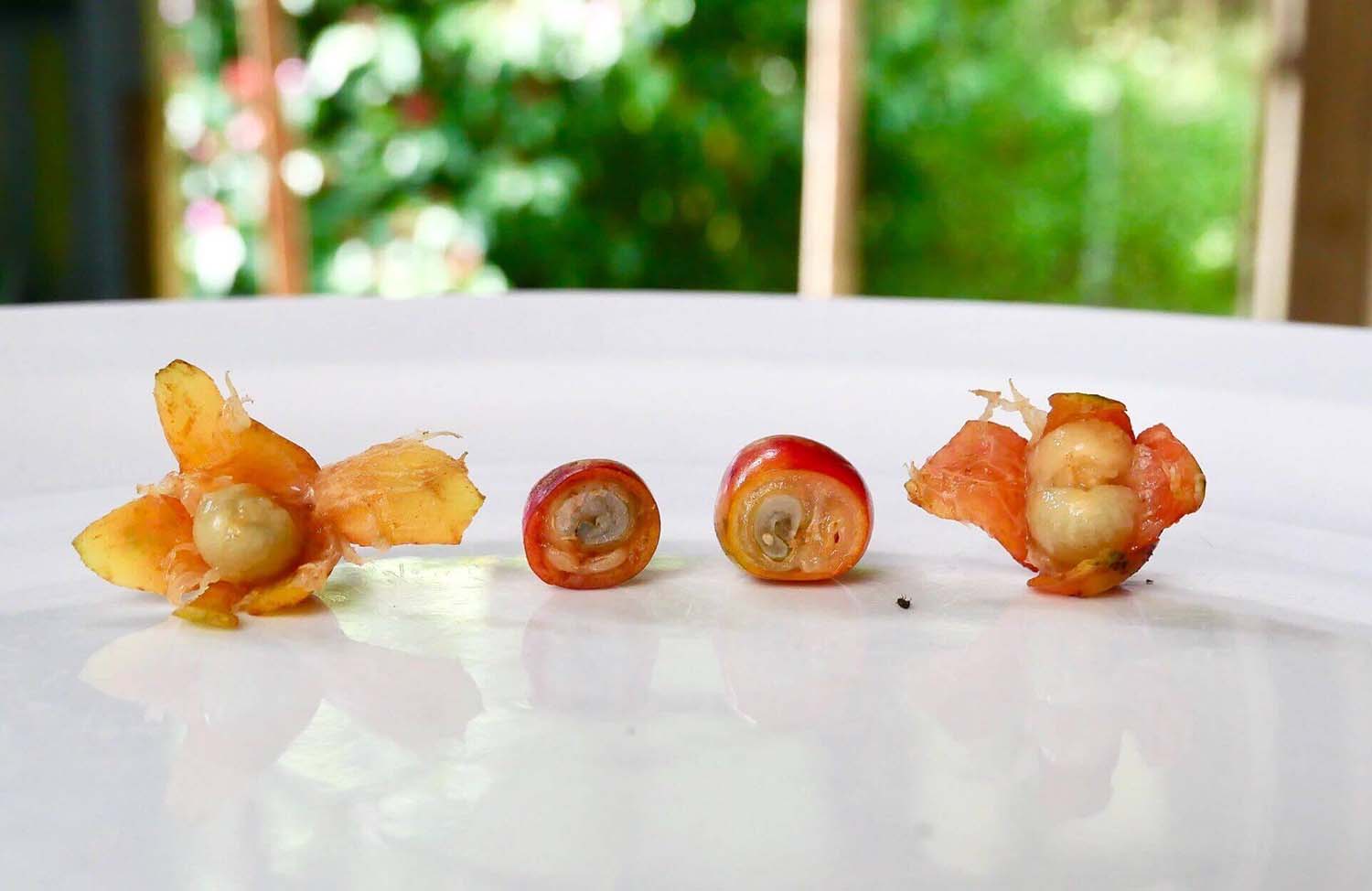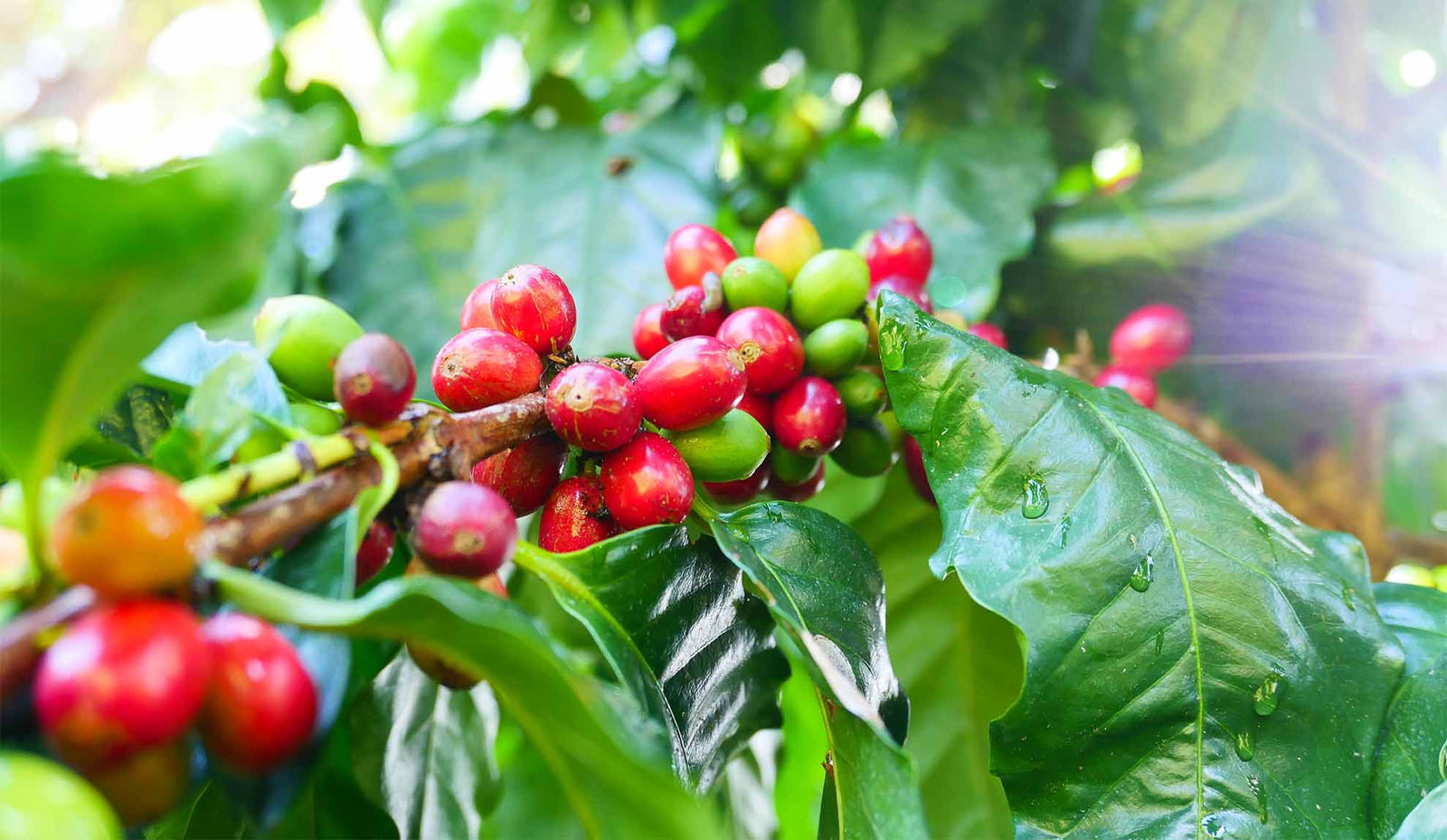Counterfeit Hawaiian blends are successful only by virtue of the brands they exploit. And those brands have been earned through the very hard work of many farmers and retailers over the course of several years.
Pictured below is a big source of contention for many of us in Hawaii's coffee trade. What looks like 100% Hawaiian coffee is actually a Hawaiian blend. Note that "blend" is not used on the front of the bag. Instead, the ingredients are listed on the back of the bag (in small print): Arabica coffee, Kona coffee, flavors. While this kind of labeling is illegal in Hawaii, it is perfectly legal on the mainland. As long as two little beans originate from Kona, it can be sold as Kona without having to disclose the amount and without upfront, clear labeling.

The following testimony was submitted to fellow farmers and legislators at this year's geographical designation committees. Here, we are making our testimony public. If you have any questions about the current laws, or thoughts on the discussion, please contact us at hello@bigislandcoffeeroasters.com
As a coffee farmer, roaster and retailer, I perceive and value Hawaii as sacred. The reasons are too numerous to list but there is a conceptual thread that unifies nearly all of them: excellence. As an agricultural state, we do not just produce coffee, pineapple or papaya -- we produce Hawaiian coffee, pineapple and papaya. But the islands can only provide so much. With a very limited land area, any agricultural goods produced in Hawaii must compete with quality, not price, in the world market. Therefore, what we as a statewide community choose to produce must be done in a manner that develops and maintains the brand of Hawaii because, ultimately, it is our collective excellence that distinguishes us from mere world commodities and allows us to flourish.
Our situation is not unique. In the world of specialty coffee, geographical designation communicates value to the coffee drinker. It evokes a sense of place and authenticity. People are becoming more interested and involved in the origins of the goods they consume. And people are also more engaged with refining their taste because it allows them to express their individuality. The more opportunity for discernment and differentiation, the greater the individual expression and the more people identify with the origin, the brand. If we are to maintain a vibrant, long-term specialty coffee industry in Hawaii, we need to ensure we grow with, or ahead of, that trend. We need to promote refining peoples’ taste, from the farmer to the consumer, via education and awareness. We want people to tell their friends and family they drank a great honey-processed Bourbon from Puna, not just a “Hawaiian coffee”.
How do we attract peoples’ interests? By emphasizing and promoting the cultivation of a wide variety of excellent, unique coffees. Since Hawaii cannot compete with the low world coffee prices due to high production costs, we must distinguish ourselves with quality. And quality begins on the farm. Without superb coffee, the broker/retailer receives a lower price and/or runs the risk of tarnishing a delicate reputation. If the consumer is dissatisfied with the quality or perceived value, there is no reason to continue supporting that business. If this happens enough over the course of time, the brands of both the business and the product develop a poor reputation.
Geographic distinction is a very significant component of our diversity. Different islands, different elevations, different climates, different varietals and processing techniques; numerous grades and price ranges -- Hawaii’s variety is fantastic, and we can certainly continue to boost both diversity and quality to keep coffee lovers interested. We have a wealth of potential to continue building and shaping the specialty coffee market while simultaneously growing Hawaii’s economy.
How do we encourage high quality coffee production? On the industry side, as has been the case with specialty coffee for the past decade: buy high and sell higher. Quality costs more. If brokers/retailers ask for better coffee and offer more money in return, they will very likely have their request granted. Simple. This scenario has overwhelmingly demonstrated proof of concept over the last ten years. A key point is the relationship between the producer and the buyer. While the broker/retailer’s business is largely dependent on the quality of product (and their ability to market it), the farmer is dependent on the retailer’s ability to garner a price high enough to justify the added labor and time to improve quality. The livelihoods of the farmer and the retailer are intimately connected. If there is no promise or hope of higher pay for either party, there is no purpose in producing higher quality. If specialty coffee production is not economically viable, it will not survive.
On the market side, demanding coffee drinkers will help generate higher quality, which is why you may often hear the phrase "consumer education". Without an understanding, an experience, a knowledge-base of quality on behalf of coffee consumers, there is very little hope for achieving excellence and pushing innovation.
Of course, there are varying degrees of quality in the production of anything. Just because Kenya is renowned for exquisite coffee, that does not exclude low-grade coffees from its market. If strong enough, a reputation for high quality can make the existence of lower quality negligible or insignificant. But it has limits. Every brand has the potential to self-destruct. Trust develops reputation which, in turn, develops the brand. This is very difficult to achieve and it is vital to maintain. As a brand of excellence, Hawaiian coffee has preserved itself quite well for several decades. And we must constantly work to improve and sustain our position in the global specialty coffee market. We cannot risk tarnishing this trust of quality by approaching our coffee industry with a commodities perspective -- that is, quantity over quality. Stretching the Hawaii brand thin only serves to diminish its significance.
As a small business owner, my most valuable asset is the trust of my producers and my customers. I want to be known for growing, sourcing and roasting fantastic coffees. For that to happen, I need to secure trust with farmers by mutually acknowledging that our well-being is interconnected. I must promise to pay them better if they provide me with better coffee. And my customers trust that paying a little bit more for their coffee compared to my competitors is justified because I’m paying higher prices for higher quality coffee, not just increasing my profit margin. Transparency and traceability of the supply chain create a stronger, more stable and prosperous economy for everyone involved. This is a win-win-win scenario, and it exists in reality. But it is the exception in the coffee industry when it could be the norm.
To speak directly about the hotly-debated “10% blend” issue, the truth of the matter is this: 10% blends are successful only by virtue of the brands they exploit. And those brands have been earned through the very hard work of many farmers and retailers over the course of several years. The function of our dialogue on this topic should not be to prohibit certain behavior but to encourage and promote what everybody wants: a robust coffee industry for everyone involved for the greatest length of time. The question is not, “How can we discourage unwanted consequences?” but rather, “What circumstances create opportunities for everyone to improve?” The answer lies in the Hawaii brand.
We should ask ourselves, “How well does 10% represent us? Does it help build and preserve Hawaii?”
As a farmer, I would rather be a representative of 100% Hawaii. I understand the relationship between my personal success and how that reflects upon the district of Puna, the Big Island and Hawaii. I represent myself and the expanding community around me because I live and work here. The more we can positively influence every layer of our community, the better life will be for everyone. We should pursue a greater collective coordination of individuals.




